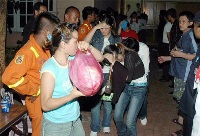400 North Korean refugees in Thai immigration facility launch hunger strike
More than 400 North Korean refugees being held in a Thai immigration facility have launched a hunger strike, demanding they be sent to South Korea.

The North Koreans 100 men and 314 women have been staying in a cramped immigration detention center in the Thai capital, Bangkok, for about three months and waiting to leave for the South, said Lee Ho-taeg, an official of a South Korean group that aids North Korean refugees.
North Koreans have been arriving in Thailand and usually staying there for about three months before being allowed to fly to South Korea, but "the flow has stopped," leading to the hunger strike since Tuesday, Lee said.
Three refugees were taken to a hospital after collapsing when a Thai immigration official threatened to send them back to their homeland, Lee said, citing a phone conversation with a South Korean activist in Thailand.
The official had told the defectors they could get to the South if they ended the hunger strike, but the refugees demanded to see their air tickets before complying.
A South Korean diplomat in Bangkok, reached by telephone from Seoul, said moves were under way to bring the refugees to the South, noting that Thailand has never returned North Korean refugees to their home. The diplomat asked not to be identified, citing policy.
Earlier Wednesday, South Korean Foreign Minister Song Min-soon said his country was consulting with Thai authorities to resolve the issue. He declined to give further details.
Separately, three young North Korean defectors who were arrested in Laos have been handed over to the South's there, Lee said. Song refused to confirm the information.
Thousands of North Koreans have fled their communist homeland to escape hunger and harsh political oppression in recent years, many taking a long and risky land journey through China to Thailand, Vietnam, Cambodia and other southeast Asian countries on their way to asylum.
More than 10,000 North Koreans have defected to South Korea since the Korean War ended in 1953, most of them arriving in recent years.
Seoul has said it would accept any North Korean who wants to resettle in the South, but it is concerned the rapid increase in arrivals could strain inter-Korean ties and complicate international efforts to resolve the North's nuclear program.
In 2004, Seoul airlifted about 460 North Koreans out of Vietnam the biggest mass defection ever drawing rebukes from Pyongyang and leading to a chill in inter-Korean relations.
Subscribe to Pravda.Ru Telegram channel, Facebook, RSS!





